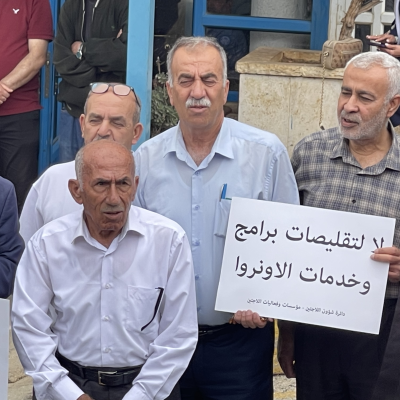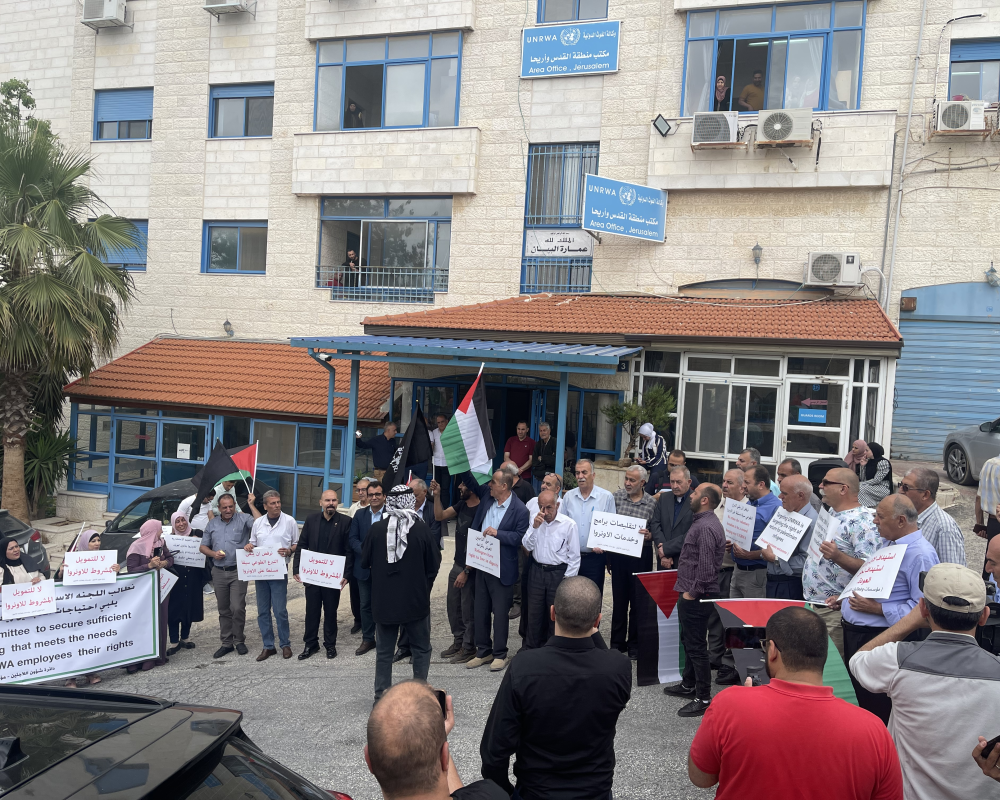
Ramallah / PNN /
Simultaneously with the convening of the Advisory Committee sessions of the United Nations Relief and Works Agency for Palestine Refugees (UNRWA) in Beirut and the commemoration of World Refugee Day, the Refugee Affairs Department of the Palestine Liberation Organization organized protest vigils in front of UNRWA headquarters in Ramallah, Gaza, Beirut, and several other locations. The vigils aimed to demand that the United Nations and the international community fulfill their responsibilities towards Palestinian refugees and reject policies that reduce services provided by UNRWA.
At the beginning of the vigil in Ramallah, which took place in front of the UNRWA office in Beitunia, dozens of Palestinians gathered, including politicians, representatives of the Refugee Affairs Department, representatives of popular committees in West Bank camps, human rights institutions, and local and international media representatives.
Participants raised Palestinian flags and banners calling on the United Nations to fulfill its responsibilities towards refugees in Palestine. Some banners emphasized the rejection of the austerity measures implemented by UNRWA.
The event and vigil were attended by members of the organization's executive committee, including Wasel Abu Youssef and Bassem Al-Salhi, as well as Anwar Hammam, Deputy Director of the Refugee Affairs Department, Mohammed Alian, Director-General of the camps, and representatives of popular committees and various institutions.
Abu Youssef: The Executive Committee continues its political struggle to preserve UNRWA's status and enhance its work.
Wasel Abu Youssef, a member of Palestine Liberation Organization Executive Committee, stated that this event aims to reaffirm the unity of our people and their alignment around central issues, especially the right of return. He emphasized that the refugee issue is at the heart of the conflict with the occupier, and the refugee camps are fortresses of confrontation, resilience, and adherence to principles.
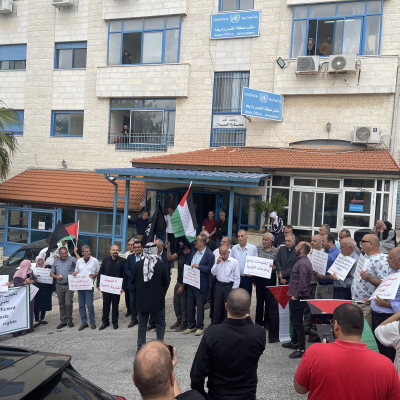
Abu Youssef extended his greetings to the Jenin camp, which yesterday exemplified a heroic struggle and demonstrated steadfastness and resilience in the face of Israeli aggression. He emphasized the importance of synchronization in these activities to underscore our people's rejection, as well as that of UNRWA and the United Nations, of the policy of reducing services, which will have repercussions on various aspects of life in the camps.
Abu Youssef also referred to the recent strike by employees in the West Bank, stressing that this strike served as a means to express our commitment to our rights.
Abu Youssef also emphasized that the Executive Committee continues its struggle to solidify UNRWA and ensure that no plans to liquidate the refugee issue are passed. He stressed that today's vigil in front of UNRWA headquarters sends a message to the participants in the Advisory Committee conference, under the slogan "No to all these reductions and no to incapacity." He stated that these reductions will reflect on the level of services provided to our people, emphasizing that the issue, for us, is a matter of rights and political existence, not merely material rights.
Al-Salhi: The refugee issue requires everyone's unity and integration.
In turn, Bassem Al-Salhi, a member of the Executive Committee of the Palestine Liberation Organization, stated that today we stand here to affirm our rejection of all schemes aimed at ending the refugee issue and dissolving it in various forms, including the lack of financial budgets for UNRWA services, in an attempt to implement plans and conspiracies to circumvent our national rights, most notably the right of return.
Al-Salhi referred to the plan of former US President Donald Trump to liquidate the refugee issue and his efforts to implement conditional programs and plans. He pointed out that there are those who continue to implement reductions and attempt to find alternatives to the agency. Therefore, we must pay attention to an important matter: the Palestinian refugee issue is an international issue that will only end with the implementation of the right of return.
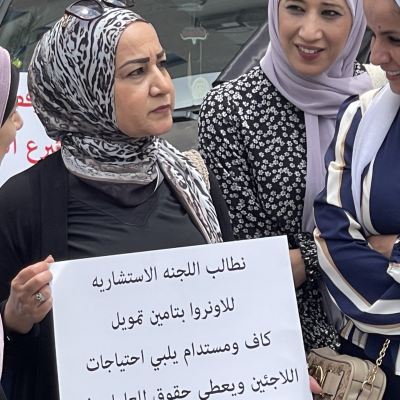
Al-Salhi called for enhancing cooperation between the popular committees in all camps, the Department of Refugee Affairs, and the Arab Employees Union in UNRWA to strengthen the rights of the refugees because their issue is the issue of our entire people. He also called for learning from the lessons of the strike, which reminds us of the importance of integration in our work.
Al-Salhi demanded that the Advisory Committee take into account the changes that have occurred over the years regarding the situation of refugees and employees, ensuring fairness for employees and refugees who should have increased services rather than being reduced due to their increasing numbers. He emphasized the need to safeguard these rights.
Hamam: The responsibility of the United Nations is to provide support to UNRWA and not to deal with double standards.
Anwar Hamam, Deputy of the head of PLO Refugee Affairs Department, stated that the policy of reducing services due to limited budgets is an argument used by supporters of plans to dissolve and end UNRWA. He stressed that last year, we stood up to raise our voice against the General Commissioner's plans regarding the partnership program, which we saw as a scheme to find alternatives to UNRWA. We expressed our rejection through a popular campaign against the corporate involvement at the time.
Hamam clarified that what is happening today is an attempt to dissolve the refugee issue through the policy of reducing services, which we are calling for today through this gathering in Beirut, attended by members of the Advisory Committee of UNRWA and its supporters, to provide budgets for the relief agency.
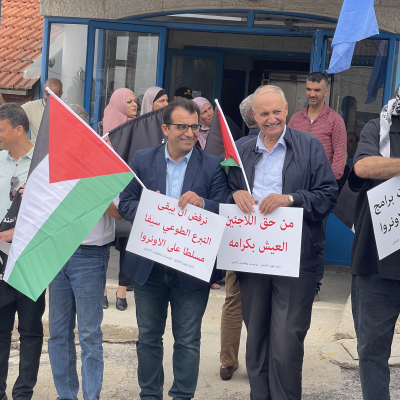
He explained that today we stand to support our delegation in the Advisory Committee, led by Dr. Ahmed Abu Holi, the head of the Refugee Affairs Department in the PLO, who is engaged in a political struggle to confront the plans to dissolve UNRWA and consequently the Palestinian national cause.
He emphasized that today we also stand to demand that the United Nations allocate budgets for UNRWA from the UN budget. Additionally, we acknowledge World Refugee Day, which falls on June 20th, and the world observes it to express our rejection of the double standards in dealing with refugee issues worldwide.
Hamam addressed the repercussions of the recent strike experienced in the refugee camps in the West Bank, where its consequences were significant. The strike reflected the need for further work on refugee and camp issues. He also emphasized the department's support for the rights of all refugees and employees in UNRWA.
He expressed gratitude to the popular committees for their services in the camps in the West Bank, as well as the representatives of the Arab Employees Union in UNRWA and representatives from various institutions and everyone who participated in these events.
Alian: The recent strike highlighted the need for more support and budgets for the camps.
Mohammed Alian, the Director-General of Camps in the Refugee Affairs Department of the PLO, stressed the importance of these events taking place simultaneously in several refugee gatherings, including Ramallah, Gaza, Beirut, Syria, and Jordan, to demand that UNRWA assume its responsibilities towards Palestinian refugees.
The director of the Camps Department in the Refugee Affairs Department of the PLO emphasized that this gathering comes after 120 days of the UNRWA employees' strike in the West Bank, which had a significant impact on various aspects of life, exacerbating the suffering of the refugees, coupled with the scarcity of budgets provided by the agency, further worsening the crisis.
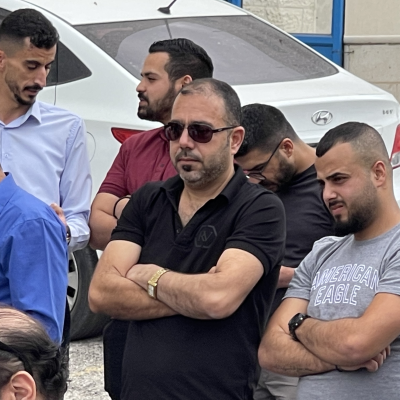
He emphasized that this gathering aims to demand the international community to fulfill its commitments towards the refugees who have been suffering in five geographical areas where they have lived in camps for 75 years: the West Bank, Gaza, Lebanon, Syria, and Jordan.
Alian affirmed that our message in this gathering represents the collective message of all Palestinians, including refugees, the department, the executive committee, the workers' union, popular committees, and institutions. It is a message of unity behind the national cause and our rejection of any attempts to diminish or dissolve our rights. He expressed gratitude to those who showed interest and followed this gathering, which coincides with similar events in Jordan, Syria, Lebanon, and Gaza.
The Popular Committees: We will not allow UNRWA to be marginalized until our original return.
The refugees themselves expressed their rejection of all UNRWA management policies driven by major powers seeking to dissolve the rights of refugees, especially the right of return. They emphasized that their most important demands revolve around the preservation of their ongoing witness to their plight for the past 75 years, with all its services intact, without any reduction or absence, until the right of return to their original villages and lands from which they were displaced in 1948 is achieved.
Afif Ghattasheh, the head of the Popular Committee for Services in Al-Fawwar Refugee Camp for Palestinian Refugees, stated that today's events confirm that the refugee issue has been, still is, and will remain at the core of the Palestinian-Arab conflict on one side and the Israeli side on the other. He emphasized that Palestinians are unified behind this issue to thwart all attempts to dissolve the right of return, which is guaranteed by international legitimacy, particularly United Nations General Assembly Resolution 194.
Ghattasheh added that the popular committees in the camps stress the need for UNRWA's continued work and reject any attempts to marginalize it. He pointed out that the agency serves as the living witness to the Palestinian catastrophe (Nakba), and they will not allow anyone to erase this right through the marginalization of UNRWA. However, he noted that UNRWA can only disappear when Palestinian refugees return to their original villages from which they were displaced due to occupation and the establishment of the State of Israel, at the expense of Palestinian rights.
